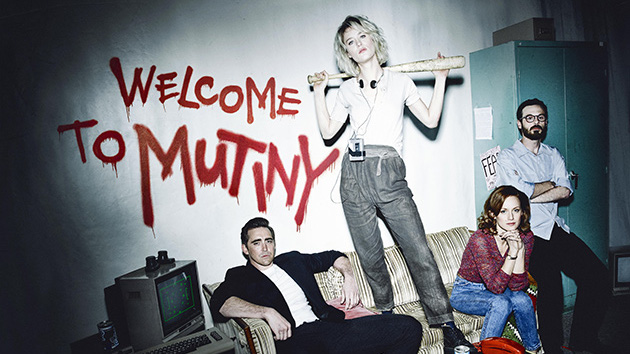Halt and Catch Fire Catches Fire

I don’t want to say that Halt and Catch Fire was a bad show in its first season. It had engaging, well-drawn characters, the setting (early ‘80s Texas) was specific and convincing, and the overall story (trying to create the first portable computer) was compelling.
But the show made a few odd missteps in that first season, starting with keeping its most compelling character (Kerry Bishe’s hardware whiz Donna) mostly peripheral to the main plot and ending with its protagonist, Lee Pace’s Steve Jobsian tech visionary Joe MacMillan, setting fire to a truck containing the first shipment of the Giant, the aformentioned portable computer.
It’s unclear if the show’s huge pivot in this second season toward its more interesting characters – Donna and Mackenzie Davis’ temperamental code prodigy Cameron – and away from Joe and Donna’s husband, hardware whiz Gordon (Scoot McNairy) was always part of the plan, or a nimble adaptation to keep the show alive. Either way, Halt and Catch Fire is enormously improved this season, and has moved so far away from the first season’s storyline that there is no real need to have seen it to enjoy the second.
In season two, Cameron has taken her talents and formed her own proto-gaming company, Mutiny, and hired Donna as her systems administrator. Joe is out of the picture and Gordon, who made a small fortune selling the Giant, is at home with the kids while Donna works. Slowly, the players come back together: Joe, whose romance with Cameron ended with the first season and the flaming truck, is engaged to the daughter of an oil company executive, who Joe persuades to let him build a mainframe of online servers; he hires Gordon to build those servers; Gordon sells Donna time on those servers when she complains that Mutiny is quickly outgrowing its homemade server bank in Cameron’s house; Joe finds out, formalizes a rental agreement, and soon the oil company is trying to buy Mutiny.
The result is that that slightly shaky first season, viewed in hindsight through the lens of this much stronger second one, plays like backstory, informing the current relationships among the principals, which are suspicious, distrustful, and alienated.
Meanwhile, Mutiny is inventing online gaming, chat, broadband, and any number of the innovations that we take for granted now but seemed like silly novelties back in 1985. Obviously, Mutiny is fictional and didn’t really invent anything, so it’s likely that the show will have to snatch each of these victories from them in order to stay (relatively) historically accurate.
Or maybe they won’t; in the most recent episodes, one character has gone to visit family in Northern California and another has announced he’s moving there, so it’s entirely possible that these characters will shoehorn themselves into Real History, a la Boardwalk Empire. Maybe they’ll go work for Apple or Microsoft or Oracle.
Regardless of the plot, the characters are interesting enough to keep this thing afloat, particularly Donna and Cameron, whose story arc as females running a start-up in the male-dominated tech world is all the more interesting for the fact that they have never made any reference to it; no one has underestimated them because they’re women, and they have never complained that they’re being treated badly because of it. They are just smart, driven, capable characters blowing the doors off of everyone around them, and I can’t wait to see what they do next.
And in case you’re wondering what that strange title is all about, well, why don’t you make use of this networked computer you’re reading this on and figure it out?
New episodes of Halt and Catch Fire air at 10pm Sundays on AMC; the three most recent episodes (which are the best of the series so far) are available on demand.
